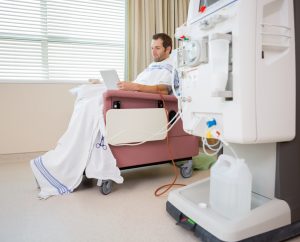
Recently introduced legislation from U.S. Sens. Todd Young (R-IN) and Dean Heller (R-NV), would enable end-stage renal disease (ESRD) dialysis patients to avoid appointments at different health care providers and instead receive comprehensive care at one location, a step toward improving their health outcomes and quality of life.
The Dialysis Patient Access To Integrated-care, Empowerment, Nephrologists, and Treatment Services (PATIENTS) Demonstration Act, would establish dialysis facilities as ESRD coordinated care centers.
Patients with chronic kidney disease or ESRD spend three days every week at a dialysis facility, according to Young’s office. They typically have several other medical appointments to juggle that may not be near their dialysis center.
“With an estimated 650,000 Americans spending multiple days a week inside a dialysis clinic just to stay alive, it’s clear that better coordinated care is needed to improve patients’ quality of living. The Dialysis PATIENTS Demonstration Act is an important step toward achieving this goal, and helping Hoosiers to live healthier and more active lives,” said Sen. Young.
Under the legislation, a nephrologist would lead care with assistance from the dialysis facility. These teams could coordinate care with Medicare Advantage plans, Medicare Prescription Drug Plans, Medicaid managed care plans, entities states deem able to bear risk, and third-party administrators, according to Young’s office.
“Nevadans suffering from end-stage renal disease (ESRD) are among the sickest and most vulnerable patients on Medicare, and they often struggle with multiple chronic conditions and require unique care,” Sen. Heller said. “I’m proud to work with my colleagues to introduce this bipartisan, patient-centered legislation that will help improve the lives of those living with ESRD, and I am committed to working with my colleagues in the Senate and House of Representatives to get it across the finish line.”
Sens. Bill Nelson (D-FL) and Michael Bennet (D-CO) signed on to the bill as original cosponsors.



